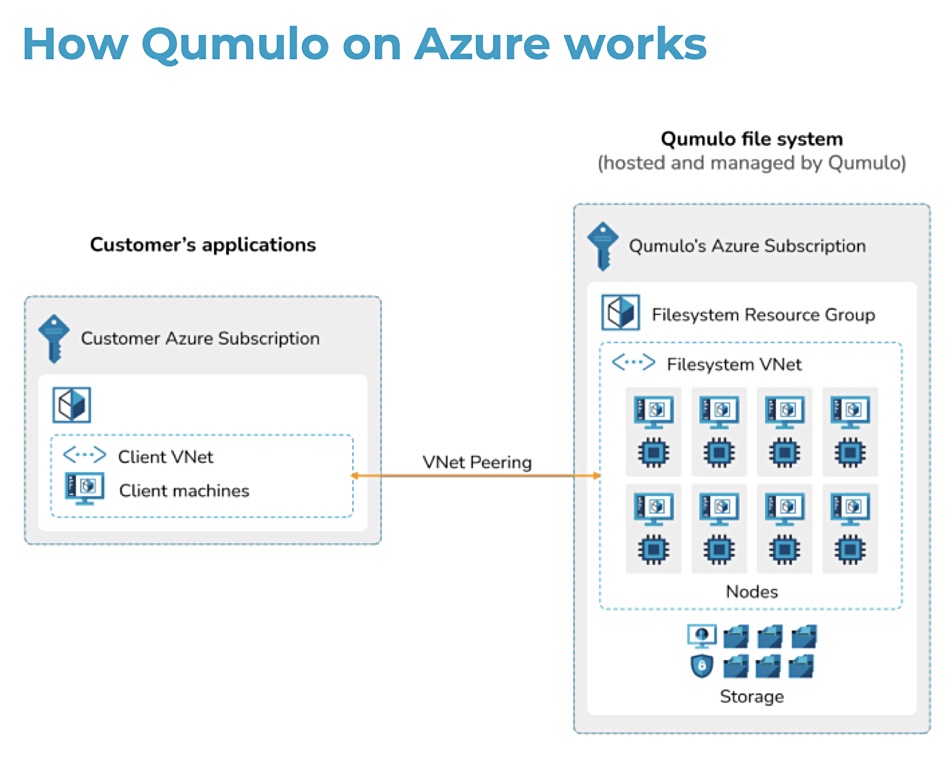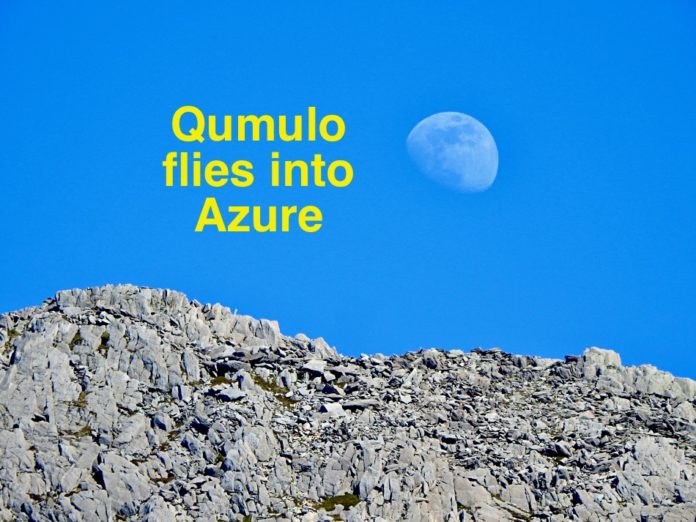Scale-out filesystem supplier Qumolo has launched its software on Microsoft’s Azure public cloud.
Qumulo on Azure as a Service (QaaS) can be used by customers to set up petabyte-scale file data lakes for video editorial, medical imaging, and AI-driven analytics workloads. QaaS accompanies Qumulo’s support for its software on AWS and GCP.
Update. NetApp Cloud Volumes information added. 9 July 2021.
Bill Richter, Qumulo CEO, issued an announcement: “Qumulo on Azure changes the game for any enterprise struggling to manage massive amounts of unstructured data. With Qumulo’s availability on Microsoft Azure, the Qumulo platform runs just about anywhere our customers want to be – whether it be in multicloud, hybrid cloud or on-premises environments.”
Qumulo’s Core filesystem software was available in AWS and the (GCP) Google Cloud Platform in January 2019; it has taken two and a half years to get it running in Azure.

QaaS is built natively on Azure and natively integrated with Azure services, such as AI, analytics and security. It can scale beyond 100TB in a single namespace and replicate from the cloud to on-premises – data centres and the edge – at no cost. The software enables customers to move their data across private and public clouds (AWS, Azure and GCP). QaaS is publicly accessible in the Azure Marketplace and is offered as a fully managed service in a pay-per-use model.
Download a QaaS datasheet here and access a test drive demo here.
Competition
Qumulo’s main competitor NetApp has also made its storage services available to Azure customers.
It has Astra support for Azure, with Astra managing the storage functions of Kubernetes-orchestrated containers. The Azure Kubernetes Service (AKS) works with Azure NetApp Files as the storage provider. Azure NetApp Files provides ONTAP storage and data management capabilities for storing, moving and deploying file-based workloads in Azure. But it is not NetApp ONTAP software running in the Azure cloud. Rather is a fully-managed Microsoft Azure cloud service based on NetApp ONTAP hardware/software systems located in Azure regional data centres.
NetApp also supplies Cloud Volumes ONTAP running on AWS, Azure and GCP. A NetApp sp[okesperson said: “NetApp’s Cloud Volumes platform has two basic implementations of ONTAP in the public cloud:
- Cloud Volumes ONTAP (CVO): ONTAP system(s) as a service, via software running on hyperscaler-provided IaaS infrastructure in the customer’s account
- Cloud Volumes Service (CVS): ONTAP volumes as a service directly from integrated NetApp systems that are provisioned as a service to customers as either 1stparty or 3rd party offerings
Cloud Volumes ONTAP is where the customer licenses NetApp’s ONTAP software (either directly via BYOL, or via the hyperscaler in a PAYGO or Marketplace transaction) and runs that on hyperscaler IaaS resources (VMs, disk, etc.) in their hyperscaler account(s). This can be either AWS, Azure, or Google Cloud. CVO is always software.
Cloud Volumes Service is where customers license ONTAP volumes ‘as a service’ by capacity consumed, in any of the three hyperscalers. In AWS and Google, these are 3rd party services available via the marketplace or from the customer’s hyperscaler console. In the case of Azure, it’s a 1st party service available directly from Microsoft, either via the marketplace or through the Azure console. CVS (including ANF in the first party scenario with Azure) is always NetApp integrated systems.
“Cloud Manager is NetApp’s SaaS-delivered control plane that can discover and manage any of these ONTAP instances – as well as on-premises ONTAP systems – to allow management such as data protection, governance, syn, tiering, etc. regardless of where these instances are.”
Dell EMC had Isilon OneFS filer support added to its Microsoft Azure ExpressRoute Local, a fast link to a nearby Azure cloud data centre. That meant data could be moved from the Isilon box to an Azure compute instance, similar to the Azure NetApp Files concept.
The newer Dell EMC PowerScale OneFS file system software can run in the AWS, Azure and Google clouds, enabling a single environment across on-premises and public cloud locations.
Startup StorONE’s S1 software runs in Azure as the S1:Azure product, and provides both block and file (NFS/SMB) services.
WekaIO also supports its filesystem software running in Azure, as well as AWS and Google.
It is becoming table stakes for a filesystem supplier to have its software running in on-premises hardware and in each of the three main public clouds: AWS, Azure and Google.








